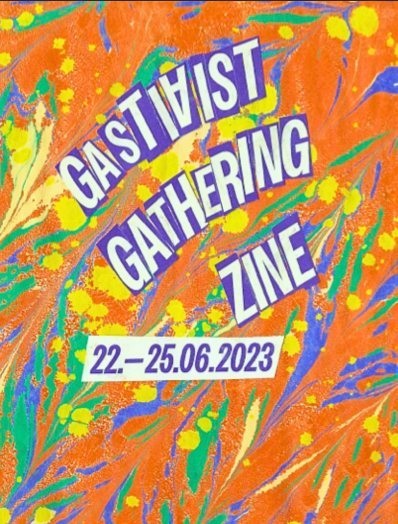When we say ‘CEE’ we mean a region of Europe that historically found itself trapped between two bigger powers – ‘the West’ and Russia. A region that is technically ‘still Europe’ but not quite what people mean when they think of Europe. The underprivileged (compared to Western Europe, still privileged compared to some other parts of the world of course), often underrepresented in discussions about global oppression and the relationship between Europe and other continents.
As Gastivists we find the work in this region important because activists here often share a feeling that something is missing from the global movement’s narrative. On one hand they consider themselves Europeans and more privileged than most of the world, meaning that they share the sense of guilt and responsibility for the climate crisis, colonialism etc. On the other hand, the reality of these countries is that they experienced years of oppression themselves, not to mention many of them didn’t even exist as independent countries before the XXth century, with the local ethnicities living under occupation of either Prussian (German), Austro-Hungarian, Ottoman or Russian empires. It’s not to try to prove that people living in the CEE are the real ‘victims’, it’s just to notice how the different history brings nuance to the often times simplified term ‘Europe’ and without acknowledging it, CEE activists are left without a space that accurately represents the challenges and privileges that they do (and don’t) have.
Ankica Sokolić, a North Macedonian activist who worked with the Gastivists as a CEE coordinator in 2023, highlights this clearly in her blog post “A tale of Two Europes” which we strongly recommend reading.

This topic is very complex and we are constantly learning and trying new ways to discuss local activists’ experience without devaluing anyone else’s. The CEE itself is not homogenous either – in our work we are finding aspects of our experiences that are similar and different. From very cultural and historical ones like if your country was ever independent before the XXth century, by which empire was it occupied, how did the transition from communism to capitalism go (or is still going…) etc. to some pretty concrete and here-and-now like is your country even in the EU, Schengen or is your country currently at war. All of this affects how the climate justice work is being approached and how the international collaboration looks like, e.g. activists from countries that require visas to travel have a much harder work to do to attend climate camps, international movement’s get-togethers etc. and that is often overlooked when it comes to technically ‘Europe-wide’ events, not to even mention that these events are usually held in Western European countries meaning just longer travels for Eastern European activists, resulting in their poorer representation.
Why do we need more climate justice work in the CEE?
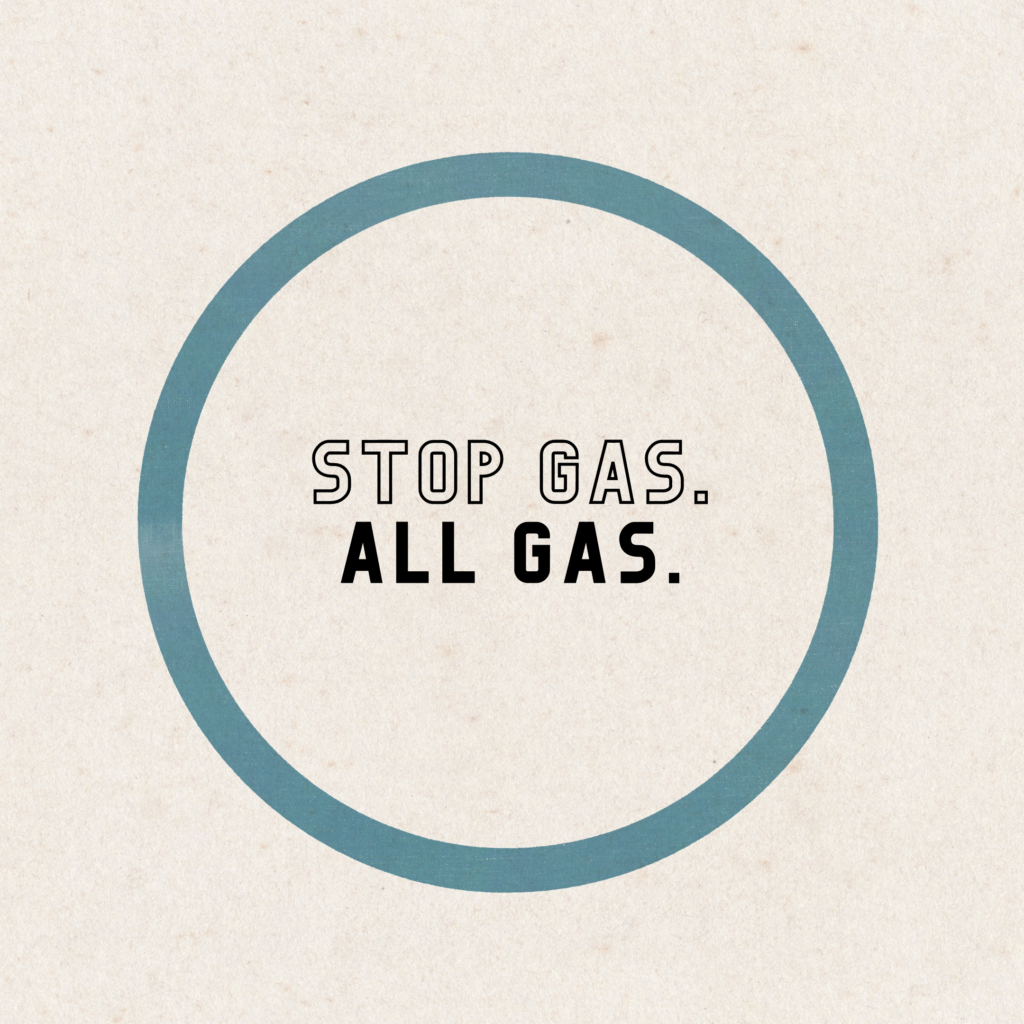
At the same time, while CEE countries are generally considered to be ‘behind’ and ‘less developed’, governments here are desperately trying to catch up, meaning that they are often trying to copy harmful and destructive practices from the West. That’s why while the public consciousness about the climate crisis is much weaker, huge investments into fossil fuels are getting stronger. We need to stop following Western Europe’s development path that puts all of us in great danger, harms people & the environment and find our own way of increasing people’s quality of life without increasing emissions and the global temperature.
Gastivists is a small collective and we by no means aspire to lead in CEE work due to lack of capacity. But we find useful and valuable to share
what we did until now:
CEE meeting in Budapest
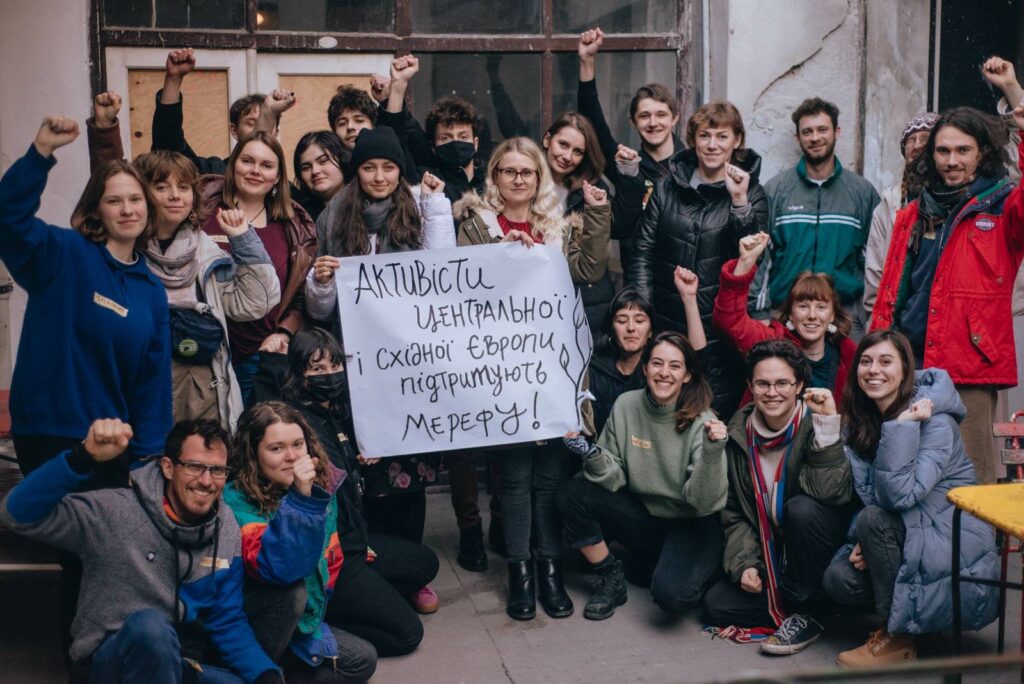
Solidarity picture from all meeting’s participants to the anti-gas struggle in Ukraine
Back in 2021 gas was practically a non-existent topic in the CEE climate activism. In the West activists were already fighting it and with the increasing public pressure the gas industry started to look into stronger greenwashing tactics like hydrogen. But in the rest of Europe gas was still seen as a very positive fuel, less polluting than coal and relatively cheap. This is what Gastivists at that time were fighting to debunk, so we decided to hold a meeting specifically for CEE activists where we’d equip them with all the knowledge and resources needed to successfully resist gas investments in their countries.
The meeting took place in February 2022 (just days before the full-scale Russian invasion of Ukraine) in Budapest. We had participants from Romania, Slovakia, Czech Republic, Poland, Hungary, Croatia and Ukraine.
We managed to discuss a lot over a course of less than 3 days: how bad gas really is for the climate, environment and the people, how we can get creative in fighting it, what was the state of play with gas investments in our region and how we can continue to exchange ideas, experience and solidarity within that group and beyond.
CEE collaborations:
We’ve also had some amazing opportunities to support and collaborate with local activists in their initiatives and / or bringing CEE perspectives in other Gastivists projects to be included.
LNG CLIMATE CAMP IN BRATISLAVA
Back in 2021 we were kindly invited to a LNG-focused climate camp in Bratislava, where they wanted to build a liquified gas terminal in the middle of the city, on the Danube river. Local activists organized a camp on the riverside, held workshops, discussions and a civil disobedience action day by the end.
As Gastivists we participated in the whole camp, but the highlight for us was a discussion panel that we were invited to speak in. We discussed the massive EU push to build fossil gas terminals under the narrative of security of supply, and how to connect the many grassroots groups fighting gas terminals to learn from our successes and strategies.
Ukraine war & fossil fuels webinar
In April 2022, two months after the full-scale Russian invasion on Ukraine, when activists were trying to figure out their way around this catastrophe, how to best support and be in solidarity, we connected with Ukrainian campaigners and organized a webinar for our climate justice friends and allies to hear from Svitlana Romanko, coordinator of https://www.with-ukraine.org/, Oleg Savitskyi, energy expert with the Ukrainian Climate Network and Julia Pashkovska, member of Stand with Ukraine and Ekoltava about the relationship between gas in Europe and the invasion of Ukraine, and discuss how to fight for energy justice and an end to the war at this moment. We talked about how to take action around the intersection between war and fossil fuels and we discussed an action day under a hashtag #ClimateJusticeAndPeace.

eastern european climate camp in prague
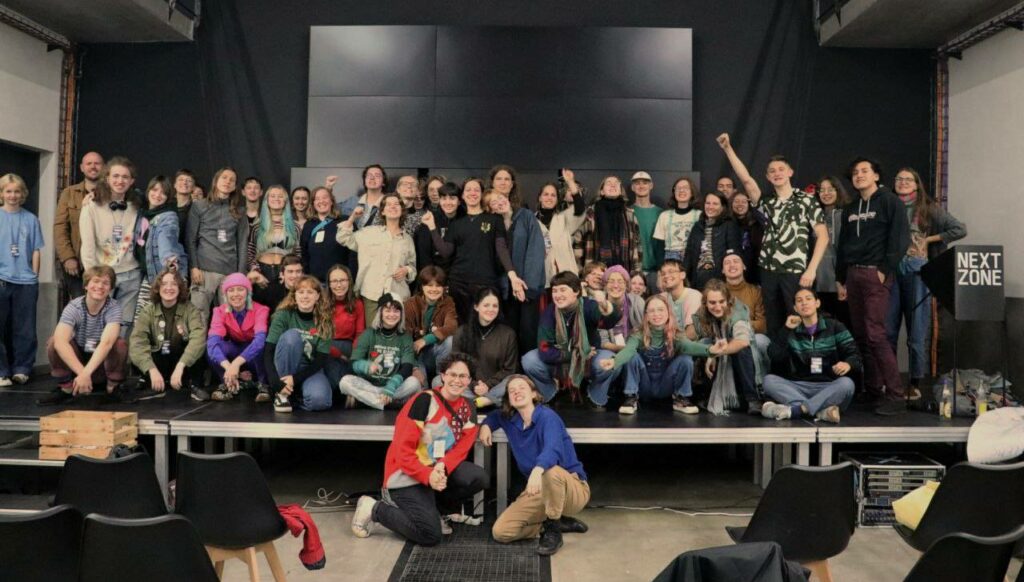
Fridays for Future and other climate organizations put together an Eastern-European themed camp in October of 2022. We supported these efforts financially to help bring as many activists as possible to this event, continuing to strengthen bonds and breed collaborations within the CEE. We also held a workshop, sharing our analysis on how the region is specific and why we should understand and adapt our activism to it, instead of copying the movements of our Western neighbors. We talked about points of common narratives when it comes to the costs of living crisis at the intersection with the pressure of developing more and more infrastructure for fossil fuels and our countries’ participation to the western understanding of this key moment in time that is actually a long lasting dynamic.
cee-focused episode of the cost of living podcast
In the Autumn and Winter of 2022, Gastivists and CEO organized bi-weekly calls to make sense of the European cost of living crisis. A diversity of actors (energy groups, housing movement, trade unions, etc) joined to understand collectively the crisis and explore intersectional solutions.
We then decided to make some of our speakers’ presentations into a podcast that you can listen to afterwards. One session, and so one podcast episode were specifically dedicated to the CEE region. You can listen to it here.
solstice gathering & follow-up
Gastivists held a large activist camp in June 2023, called the Solstice Gathering.
In there we (and specifically our at-the-time CEE coordinator) made sure that CEE activists were present and that content relevant to them was discussed. We had a moment of sharing, explaining our analysis and a spectrum lines session where activists from different European countries could compare their experiences and see how radically they vary across the continent. We also had a CEE-only discussion about our work and needs, which resulted in a follow-up workshop 2 months after the meeting.
It was a training on how to fundraise, as getting funds for their projects is one of the hardest challenges grassroots groups face. Some of it was recorded -> you can email us if you’d like to see that part!
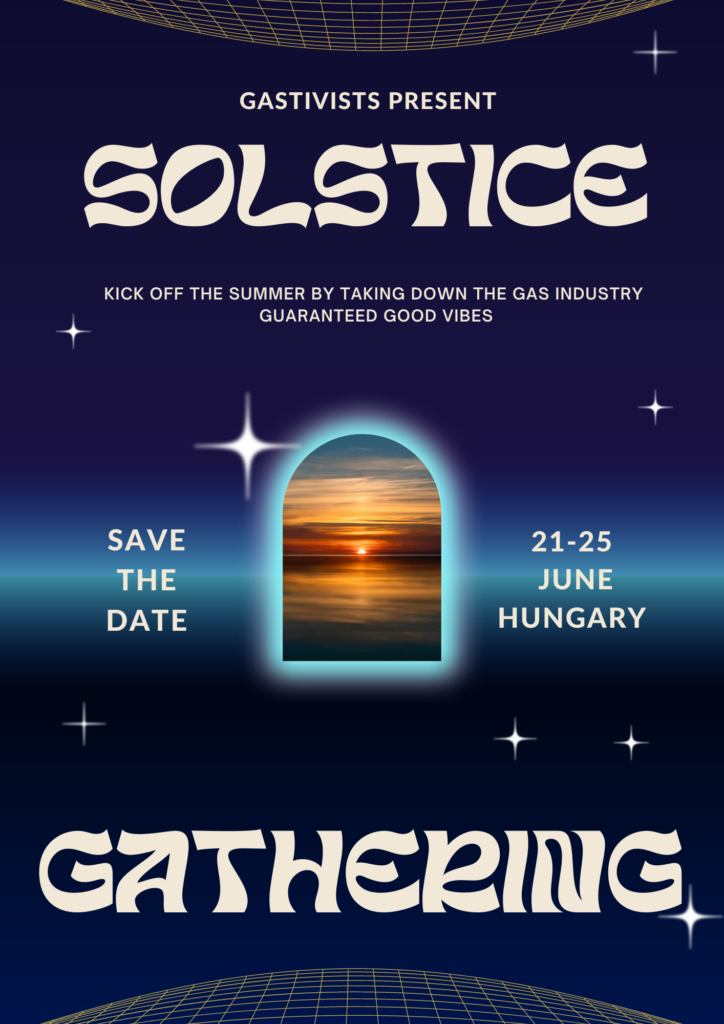
energy futures lithuania visit
One of the newest Gastivists projects is Energy Futures – a team that asks the difficult questions about our energy transitions (if not gas then what??? How do we do that without continuing neocolonial and extractivist paths? etc.) and tries to research them, talk to people and find the nuance it requires and inspiring stories from different regions. Again, one of them is the CEE. Specifically, in April 2024 we visited Lithuania for a field trip full of meetings and discussions about this specific, post-USSR context that still influences the energy discourse of today. We found space both for technical, economical and geopolitical understanding but also for emotions, memories and sentiments that local people kindly shared with us.
More details about the learnings from our trip (and other Energy Futures work) you can find in our newsletter, sign up here and read past ones here.
cee & rise of fascism - analysis
In the entire CEE region (and not only) far right parties and fascism are expanding. The way in which they tackle the subject of the climate crisis and gas needs of “the nation” can not be ignored. But we don’t have to wait to face their horrendous next steps. We can prevent their narratives so that the people don’t trust them-only in crisis. Their spaces have to be reduced and their narratives countered. We have to understand what are the incipient steps for more militarisation of the energy needs and trace the lines between far-right politics and increasing power of fossil fuel companies.
We want to do so by amplifying the regional voices that are voicing the intersection of struggles in their own terms, so we can integrate into the movement the nuances that color our collective fight. This understanding has to be done if we want to really support the movements everywhere, especially as the geopolitics at play present new crises as we roll.
E.g. in Romania, we held two public debates regarding gas exploitation in Romania’s geography and how it connects to the rise of far-right and fascist ideas.
“The rush for more gas, “from alternative sources” to Russian gas, is articulated in terms of national security, and any domestic exploitation project (e.g. the Neptun Deep exploitation perimeter in the Black Sea) or gas transport (e.g. import and export of Azerbaijan’s gas through the BRUA pipeline) are projects of national interest. In this way they arrive on NATO’s agenda too, and so they become militarized projects (protected through war if needed).”
In Poland, bombelki collective, (that since February 2024 has re-structured into Ostatnie Pokolenie) did an action regarding Poland’s Independence Day, 11th of November. Each year on this date the Independence March is held in Warsaw, but for many years now it’s not been a place to celebrate freedom, but an event co-opted by neo fascist and nationalist circles, with display of racist banners and slogans, violent clashes with the police, destroying public spaces in the city and even setting fire in an apartment that had a rainbow flag on the balcony above it.
6 people from the climate collective blocked the route of the march with their bodies and banners saying “climate crisis is driving fascism” and “no new gas”. They delayed the start of the march by around half an hour before being removed by the police.
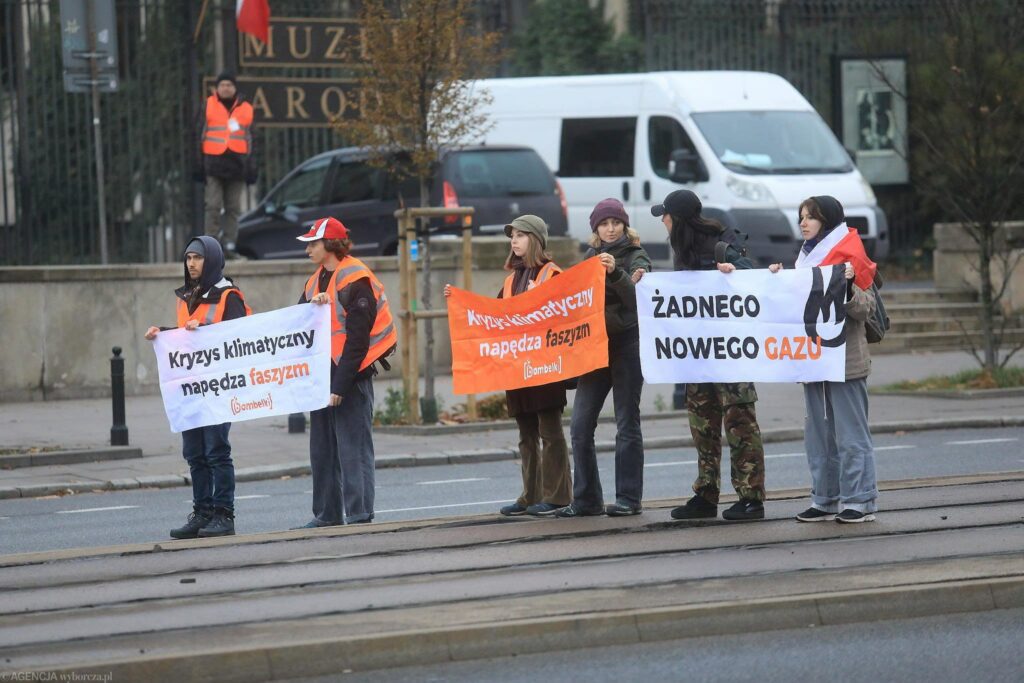
“We were afraid, but we feel this is what needs to be done. Increasing uncertainty about the future caused by conflicts, migrations and disasters gives fuel to fascists. The first and most fundamental thing we must do is cut emissions and move away from fossil fuels, because we must try as hard as we can to prevent further increases in global temperatures and the mass migration that it causes. At the same time, we must be ready to welcome and care for those who seek refuge with us, and that is why we cannot allow our society to become more racist. The fight for the climate is a fight against fascism, and the anti-fascist fight is a fight for a society that cares for each other.“

